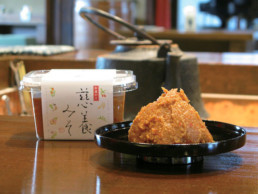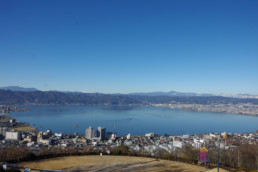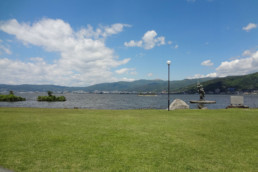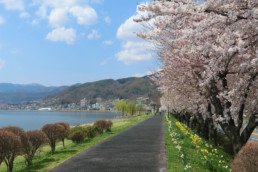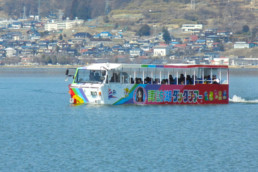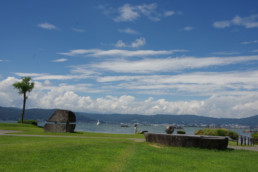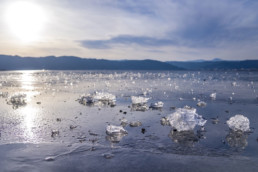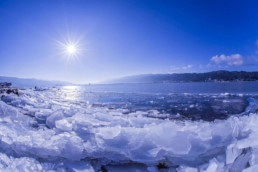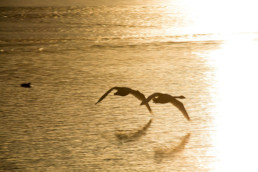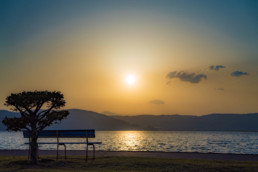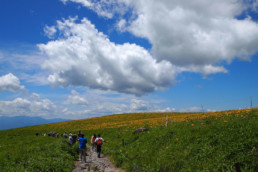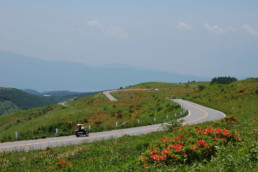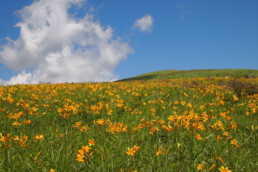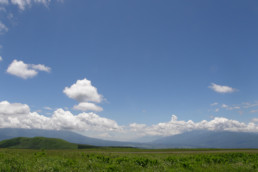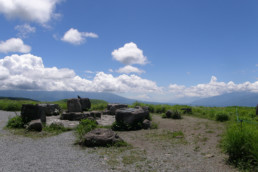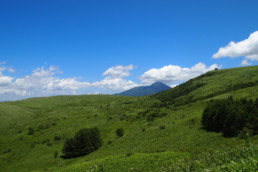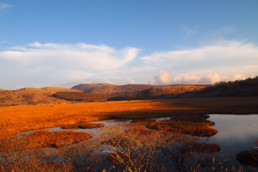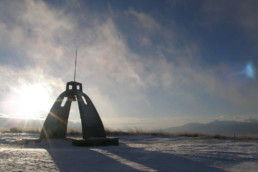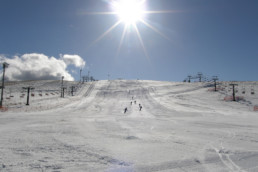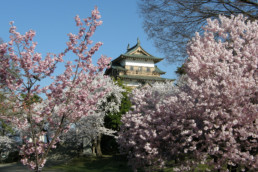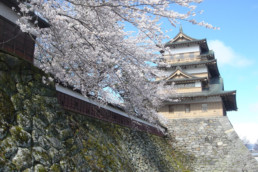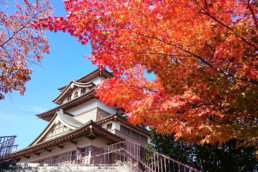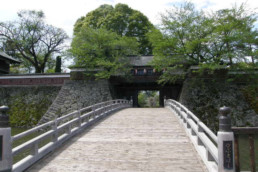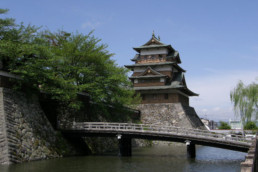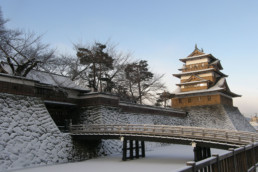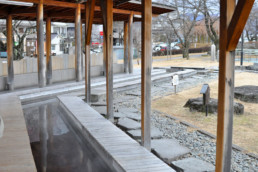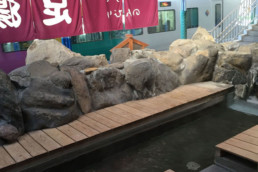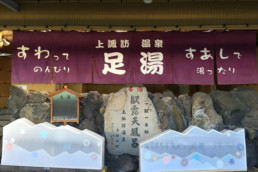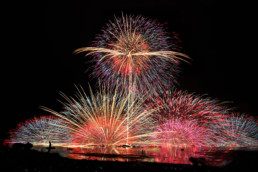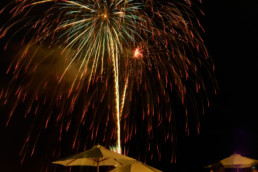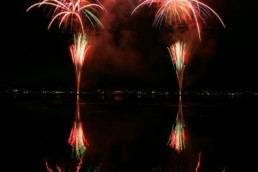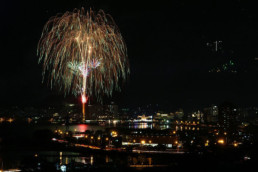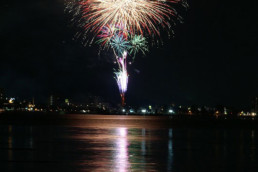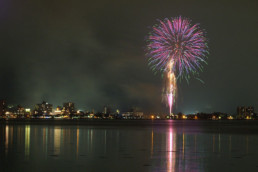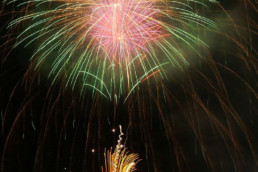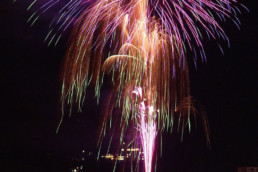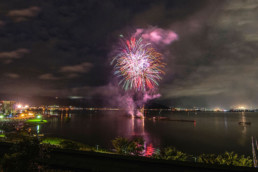The lake
Lake Suwa
The lake is located in the heart of Suwa and is the largest lake in Nagano Prefecture. Whether walking, cycling, or jogging, the lake provides a relaxing backdrop. In spring, the lake is surrounded by beautiful cherry blossoms, while summer sees it lit up by fireworks above.In warmer months, lake activities include pleasure cruises, amphibious bus tours, fishing, and more.In winter, Lake Suwa is home to an extraordinary, naturally occurring event known as Omiwatari (The God’s Crossing). Beneath Lake Suwa are warm hot spring waters that remain unfrozen during the winter months, causing pressurized ice formations to form above the lake.
The Highlands
Kirigamine Highlands
The highlands area near Mt.Kurumayama and Mt.Washigamine is a short trip from Suwa and contains spacious land with incredible mountain views of both Mt.Fuji and the Japan Alps. Starting at visit with the Kirigamine Nature Conservation Center will provide information on walking trails and the local plants and wildlife. Marshland hiking paths around the national treasure spots Yashimagahara Marsh and Ikenokurumi Odoriba Marsh are a great chance to get outdoors and get active. The large open areas are a natural area for man-made glider planes which can often be viewed in flight. To learn more about the wind-propelled planes check out the Glider Fureai Center. Spring and summer are the best times for flower viewing. Wintertime provides plenty of fun at the Kirigamine Family Ski Resort. These gentle slopes are perfect for the family, and the nearby cross-country courses are often used by Olympians as the high elevation provides excellent training grounds.
The Castle
Takashima Castle
Takashima Castle was built by Lord Hineno in 1592 and is the highest elevated castle ever constructed in Japan. Known as the “Floating Castle”, Takashima was built on a small island in Lake Suwa that was connected to the shore by only a single piece of land. Today, the lakeshore no longer reaches the sides of the castle, but the gardens and moat still exist.The Suwa clan ruled the area around Lake Suwa until 1869. In the 1870s, the castle was dismantled by order of the Meiji government, but has since been restored to its original form. The castle is best viewed and photographed in the morning hours and there are English materials available.It’s open from 9:00 to 4:30pm (5:30pm from April to September). The 1st and 2nd floors serve as a museum and the third floor is an observation deck to view the surroundings.
The Bath
Footbaths
The footbaths of Suwa are an interesting way to experience Japanese hot springs in a public setting. Footbaths can be found throughout Suwa in various areas.The Lakeside Park footbath is an outdoor bath with lake views and is located nearby the “Natural Bath Walkway”, where inset stones provide reflexology massage for your feet.Kamisuwa Station actually has footbaths on the train platforms – this is one time when waiting for your train is a good thing! The Jingu-ji Temple near Suwa Taisha is also home to a popular footbath.
HANABI
Fireworks Events
From late July to the end of August, Suwa City displays some of Japan’s largest and most well-known fireworks competitions over Lake Suwa. Lights reflect off the water and sounds echo throughout the surroundings during these beautiful night shows.There are regular fireworks displays every day during this period, with the largest held on August 15th every year.
Food and Dining
Soba
Nagano Prefecture has the perfect conditions for growing soba (buckwheat) and much of Japan’s soba noodle production occurs in the area. Suwa area’s soba is called shinshu soba, after the old name for Nagano Prefecture, and is known for its elasticity and strong fragrance.
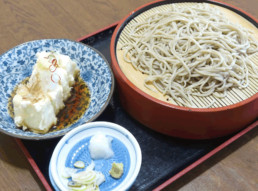
Sake
Sake is intertwined with Suwa culture and history; many of the older breweries date back nearly 400 years. There are five breweries in the area, each with a visitors’ area where sake and souvenirs are sold, and tastings are available throughout the year.
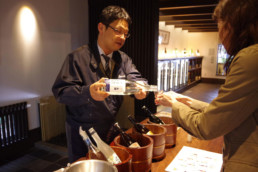
Miso
Miso production in Suwa has flourished thanks to optimal temperatures and an environment that creates a mild taste, unique to the area.A factory tour available at Miso Kengaku includes tasting and creating activities. There are a huge variety of miso products sold, including standard miso, chips, curries, dips, and even miso ice cream.
